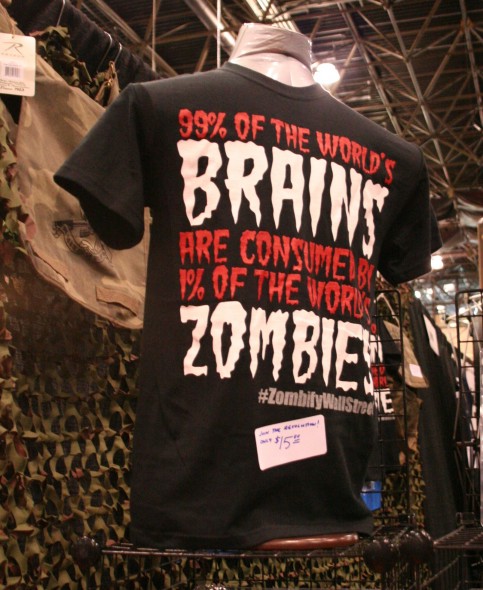I spotted this clever t-shirt on the convention floor at New York Comic-Con:

It did draw a laugh from me, but why stop there? Let’s subject the shirt’s assertion to a level of scrutiny it probably doesn’t deserve: is it possible for 99% of the world’s brains to be consumed by only 1% of the world’s zombies?
Is there an elite class of privileged zombies that have access to the tasty brains and leave only the scraps for less fortunate zombies? Should there be an extra brains tax on the elite 1% of the world’s zombies? And most importantly, why have the other 99% of zombies tolerated this inequality for so long, and when are they going to do something about it?
This all depends on the zombie apocalypse stage of crisis. If the world is lie AMC’s “The Walking Dead” (which I love!) and any notions of humanity are survived by 7-12 people, then yes. (It also dpends on whether the zombies actually eat the brains, or just snack on the juicy, tender, adrenaline marinated flesh). If the infection has started to spread, and one major city has been completly overrun, then also, yes. In this case, the zombies would have to kill the people they ate, and by ingesting the cranial capicitator, they would effectively do just that. You’re welcome.
P.S. You’re clever analogy to Wall Street, while not unappreciated, is illogical. THe zombies actions are not governed by even the most basic self-control or even sentience, which we mortals take for granted.
P.P.S. Has the “Baby Project” come to a grinding halt, or are you just waiting a while for any new installments? I’m just curious, not impatient for new installments. How could anyone be impatient for a Justin Bieber song?
I’m glad someone is still interested in the “Baby” project! It’s on hiatus. I did the first 3 recordings before my day job got very intense. When things calm down it’ll be back. But I must also admit that I was getting worn out on the song and needed to step away from it for a bit.
Heart.
“99% of the world’s humans are consumed by 1% of the world’s zombies.”
So 1% of 1% of the world’s population is eating people. I’m not a math person, so someone please correct me if I’m wrong, but let’s look at this:
1/100= .01 = Percent of zombies in the world with respect to world population (assuming the missing portion of the “99% of humans” is the zombie population)
.01/100= .0001 = Percent of zombies eating humans, with respect to world population
I just don’t see this as possible. It would take the zombies actually doing any eating decades to eat the humans, even if they’re the fast, run, Romero types. And unless the number of successful meals resulting in the death of the human was consistently proportional to failed ones resulting in the death of the zombie, the zombie population would rise with respect to the overall population- and if that 1% figure of consuming zombies remained constant, they’d have to be dying off at a rate negatively correlated to any sort of rise in their population.
But it also begs the question, as you point out, Lee, What is the other 99% of the zombie population doing? Now, this raises something I don’t think considered a lot in zombie lore: Extraction of waste material. Some zombies blow chunks, but not all of them. So what, do they poop? Or would the zombies be so wrapped up in their impulse to consume humans that they’d eat until they exploded, thus creating a natural population control that would keep ^those^ figures accurate? Again, that would be rather slow-going, and I imagine the entire zombie population would be killed off rather quickly by the humans. But if we knew infection and death rates, we may be able to predict something. We’d also have to account for human population growth.
Dick Cheney has not had a pulse in more than a year, yet continues to sneer and hiss at the audience in talk show appearances.
http://www.popsci.com/science/article/2010-07/dick-cheney-gains-new-lease-life-loses-pulse
This is what just one of his victims looks like:
http://2010.newsweek.com/top-10/accidental-celebrities/harry-whittington.html
Zombie.